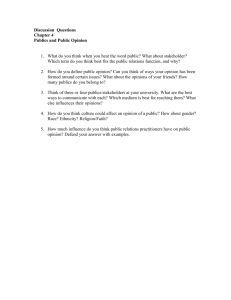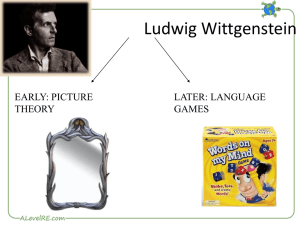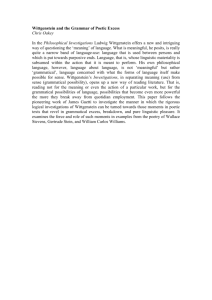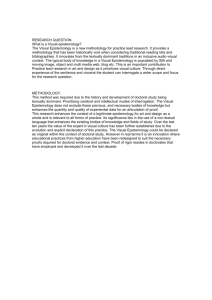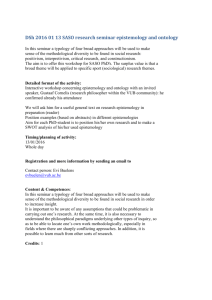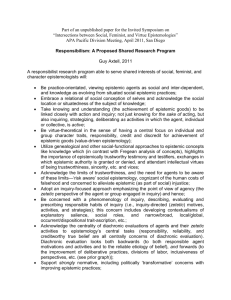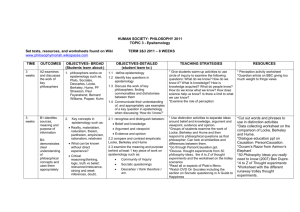If You Believe in Truth, Fight for Justice (Word)
advertisement
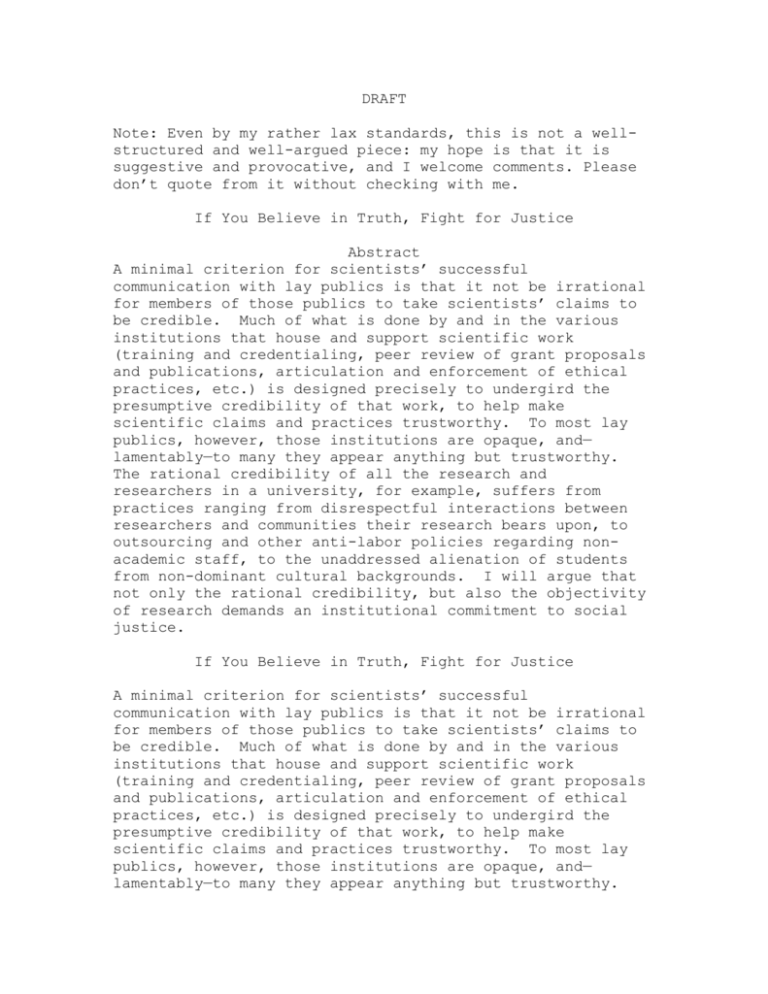
DRAFT Note: Even by my rather lax standards, this is not a wellstructured and well-argued piece: my hope is that it is suggestive and provocative, and I welcome comments. Please don’t quote from it without checking with me. If You Believe in Truth, Fight for Justice Abstract A minimal criterion for scientists’ successful communication with lay publics is that it not be irrational for members of those publics to take scientists’ claims to be credible. Much of what is done by and in the various institutions that house and support scientific work (training and credentialing, peer review of grant proposals and publications, articulation and enforcement of ethical practices, etc.) is designed precisely to undergird the presumptive credibility of that work, to help make scientific claims and practices trustworthy. To most lay publics, however, those institutions are opaque, and— lamentably—to many they appear anything but trustworthy. The rational credibility of all the research and researchers in a university, for example, suffers from practices ranging from disrespectful interactions between researchers and communities their research bears upon, to outsourcing and other anti-labor policies regarding nonacademic staff, to the unaddressed alienation of students from non-dominant cultural backgrounds. I will argue that not only the rational credibility, but also the objectivity of research demands an institutional commitment to social justice. If You Believe in Truth, Fight for Justice A minimal criterion for scientists’ successful communication with lay publics is that it not be irrational for members of those publics to take scientists’ claims to be credible. Much of what is done by and in the various institutions that house and support scientific work (training and credentialing, peer review of grant proposals and publications, articulation and enforcement of ethical practices, etc.) is designed precisely to undergird the presumptive credibility of that work, to help make scientific claims and practices trustworthy. To most lay publics, however, those institutions are opaque, and— lamentably—to many they appear anything but trustworthy. The rational credibility of all the research and researchers in a university, for example, suffers from practices ranging from disrespectful interactions between researchers and communities their research bears upon, to outsourcing and other anti-labor policies regarding nonacademic staff, to the unaddressed alienation of students from non-dominant cultural backgrounds. I want to argue that not only the rational credibility, but also the objectivity of research demands an institutional commitment to social justice. My aim is to make a case for the centrality to 21st century epistemology and philosophy of science of ethically and politically engaged social epistemology. We need, I want to suggest, a fundamental reorientation of these fields away from the epistemological problems that start inside the consciousness of an individual knower and toward the problems that confront those who would, in today’s world, be doxastically responsible. The orientation of epistemology around the problems confronting an individual knower has a well-know, if underappreciated, history. The social, cultural, economic, and political revolutions of modernity—notably including those that grounded modern science—each required and collectively constructed the individual subject, in particular as authoritative. One’s station in life was to be determined by one’s individual talents and efforts, the power of the state was to be legitimated by appeal to the rights and interests of individual citizens, morality was to be grounded in individual reason and conscience, and knowledge was to be sought by individuals empowered to pursue and recognize it. In the latter two situations in particular the transfer of authority to individuals posed an obvious problem: what if they disagreed? Think about the paradigm example for the emergence of the scientific revolution— Galileo’s concluding, based in part on his telescopic observations, that the earth revolved around the sun. What if someone else, using some other device, reached a different conclusion? Epistemic individualism wasn’t supposed to lead to epistemic individuality; it was supposed to lead to the truth. The importance of scientific method lies in its promise that those who comply with it will arrive at identical, or compatible, results, usually expressed in terms of discovering the truth (or, at least, moving reliably in its 2 direction). For Descartes, generally granted paternity of this way of thinking and of the many philosophical problems it engenders, what this promise meant in theory was that independent researchers would arrive at the same place, each pursuing knowledge on his or her own. But even in his own time and overwhelmingly in ours the promise has meant in practice that we could rely on others to discover facts about the world we were unable to discover for ourselves. Scientific method, that is, has grounded the rationally sanctioned response to unavoidable epistemic dependency, namely trust in testimony, specifically the testimony of experts. One cornerstone to that trust has been the institutionalization of expertise—in the training, selection, and credentialing of experts and in the oversight of their practice. Think about institutions charged with the discovery/creation of knowledge—centrally universities, but also other sites of disciplined expertise, including engineering, manufacturing, medicine, agriculture, government, social services, the military, etc.—everywhere some people claim to have knowledge not readily available to those without specialized training and access to sources of relevant data or evidence. How can the knowledge claims that issue from such sites be credible to outsiders? How, that is, can rational and reasonably autonomous agents make doxastic decisions that require them to rely on testimony, trusting claims they cannot independently verify, made by agents they cannot individually vet? Descartes and the other philosophers of epistemic modernity answered this question by appeal to generic human rationality: if your doxastic choices were deemed worthy of consideration, then you were essentially the same as those with the expertise and could trust that, if they were following the specified disciplined method, the results they came up with would be the same as those you would come up with, were you to follow that same method. Those who were regarded as not essentially interchangeable with the experts were, tautologically, those whose doxastic behavior was taken to be fundamentally unreliable—precisely because of their essential difference. Thus, the progress of liberalism has been marked by more and more groups’ staking a claim to essential sameness. As unfinished as this liberal agenda remains, it has—since at least the mid-1960’s—fallen into increasing disfavor— 3 with post-colonial nationalisms, Black nationalism, queer theory and activism, many forms of feminism, and some disability rights theory and activism. From these perspectives, the political goal is not recognition in the ranks of the same, and diversity is not seen as either superficial or as a liability. While some post-modern theorists take the implication of such moves to be the demise of notions of objectivity, truth, and reality (or at least the irreducible pluralization of the latter two), there are good reasons for resisting such claims—reasons that are grounded in the dependency we all have on unverifiable expertise. If I need to know if it’s safe to drink the water, a playful pluralism is not very helpful—I need the truth. Thus, there is a pressing need for practical, public epistemology, which starts with the recognition that what we take to be the founding texts of the field in its modern incarnation—those that gave us the conception of rational individual thought leading to universally justified belief and even knowledge—were just that: public, engaged epistemology, rather than the exercise of pure reason that we have been taught to regard them as. They were interventions into questions of enormous public moment— explicit attempts to craft both individual personhood and the (singular) public that could be its collective expression. It should be clear that such discussions are once again urgently needed, since the past half-century has effectively undermined the work of our 17th C predecessors, and we have not yet found anything to replace it. Part of that undermining has been a diminishing ability to rely on (either a shared conception of or the reality of) “the public.” There are two major, and quite divergent, difficulties in thinking about the public nowadays (I’ll be talking specifically about the U.S., but the phenomena in question are importantly trans-national.) The first is the phenomenon of structural adjustment’s coming home to roost. The rhetoric behind pressuring debtor nations to privatize at least everything that could conceivably be privatized, has struck a chord with influential social, political, and economic forces in the U.S., leading to the weakening of support for our few genuinely public institutions, notably those involved in education at all levels. (The extent to which this trend might be reversible, in part through the Obama administration’s responses to the crises that have predictably followed the erosion of the public sphere is an 4 open question.) These developments are especially salient to those of us who teach in (increasingly nominally) public colleges and universities, which are becoming “private publics,” increasingly dependent on increasingly private research funding, endowments that are coming to rival those of private universities, and tuition increases. The latter are, we are told, to be off-set by financial aid, which, however, is increasingly based on merit, rather than need, with “merit” defined in ways—standardized tests and GPA’s adjusted for the quality of the school and the availability of advanced placement courses—that are correlated with relative affluence—i.e., negatively correlated with need. The privatization of public universities, thus, on the education side, exacerbates the widening wealth gap and increasing class stratification, placing public universities increasingly in the camp of social institutions associated with the contraction of democracy, rather than—as had historically been the case—with its expansion. On the research side privatization leads to the setting of research agendas in line with corporate profit rather than either human need or scientific curiosity, as well as to now well-documented conflicts of interest, and hence to the growing public distrust of scientific expertise. The perception—and often the reality—of university-based research is that it is no longer especially trustworthy, a development that further erodes public support and further undermines the attractiveness of universities as sites for research, since the relatively greater oversight and bureaucratic hurdles (compared to research in the private sector) no longer reliably pay off in terms of greater acceptance of the results both within and beyond scientific communities. There’s a consequent rush toward the bottom— as research is not only conducted in private settings in the U.S., but, for a range of reasons, out-sourced to other, typically poorer, countries—leading universities to further relax their standards in an attempt to compete.1 Two recent articles in the Business section of the New York Times illustrate the problem: One (Natasha Singer, 18 February 2009) reports on an article in the New England Journal of Medicine (19 February 2009), “Ethical and Scientific Implications of the Globalization of Clinical Research,” about the potential ethical and scientific problems of drug trials’ being increasingly carried out in developing countries. A second 1 5 The other major strain on the concept of the public is pluralization—the widely lamented, so-called “Balkanization” into many publics, typically delineated along identity lines. On one dominant view of the matter, this fragmentation undercuts the force of notions like objectivity, truth, and reality itself, by denying the common humanness that unites us, beneath merely superficial difference, and that supposedly allows us to adopt a disinterested perspective from which the world appears as it really is. This is a long and oft-told story, but I want to bring it together with concerns about privatization. Apparently, the two forces are working in tandem to undermine a viable notion of the public, whether that be in determining, and embracing, the common good, or in appealing to the public nature of evidence and argument to ground notions like objectivity. In practice, however, those who decry one development are generally unconcerned about the other, an example of a not uncommon schism in political thinking—so that, for example, those who wax eloquent about the ways in which feminism is supposedly undermining the family are typically ill-disposed toward arguments that the workings of late capitalism are having precisely that effect. I want to look at the opposite set of views (in part because I share them)—decrying the privatization of the public while applauding its pluralization. I want to suggest that the appearance that pluralization undermines viable notions of objectivity, truth, and reality is just that—(mere) appearance. I want to suggest, instead, that the embrace of diversity is a route to the restoration of genuinely public goods and the responsibility for them—and that we can best understand objectivity, truth, and the conception of a shared reality as public goods, dependent on expert testimony held to public—ethical and political— standards. Furthermore, I want to suggest that philosophers have a distinctive role to play, one that is parallel to the role played by philosophers in the long 17th C in articulating the conceptions of individual personhood and generically human rationality that grounded not only the scientific revolution but equally the rise of capitalism and the liberal nation state. (Andrew Pollack, 19 February 2009) reports on the problems university-based plant scientists are facing in doing research on genetically modified crops, since the companies that own the patents on the seeds refuse to allow them to be grown for research purposes. 6 One especially salient feature of classic modern epistemology is its foundationalism, which can take various forms, but which has at its heart the metaphorical notion that we (the recognized generic knowers) are all standing on the common ground of shared rationality and (at least potentially) shared experience, ground in which scientific knowledge in particular can and should be firmly rooted. Conversely, the rejection of foundationalism is characteristic of otherwise widely diverse post-modern approaches to (or rejections of) epistemology; and that rejection of common ground has led to the conclusion that (for better or worse) objectivity, truth, and reality are all in trouble. I want to suggest, however, that in rejecting metaphoric, foundational grounding we should not lose sight of the literal ground that connects us to each other. Nor should we lose sight of—or fail to adequately appreciate—the fact that while the foundations on which rational argumentation was supposed to rest were an illusion, it was no illusion that, sometimes, the arguments did actually work; and there is no reason why they should not continue to do so—unless, of course, they shouldn’t work, because they’re bad arguments, in which case someone should point that out. Maybe doing so will work; maybe it won’t; but in either case the relevance of the “really real” will be inferential rather than practically efficacious: anything actually a part of the practices of persuasion lacks the independence supposedly definitive of Reality. The real problem with foundationalism is that the foundations are never there when you need them: either we all agree—about the self-evident truths, or the empirical evidence, or the line of reasoning—in which case it doesn’t matter whether we have foundations or not; or we disagree, in which case it does no good at all for me to claim that my views are objectively true, grounded in reality as it really is, since you’ll say exactly the same things about your views. It is, to say the least, baffling that credit for hard-headed realism goes to those who scrupulously ignore what really matters in the course of real disputes about things that affect real lives, placing their faith instead in something always over an ever-receding horizon. The preceding paragraph is, I hope, recognizably 7 Wittgensteinian in spirit, and I want to suggest a reading of his later work that places it in relation to feminist— but also, or as inflected by, queer, anti-racist, and postcolonial—theory and politics. Wittgenstein famously urges us to “bring our words back home” from the “holiday” on which philosophers are wont to take them, the idea being that—unmoored from their tethering to ordinary use—words take on exotic trappings and consort with suspicious characters who claim to know better than do those boring folks back home what the words really need, and, in the name of those supposed needs, make firm, albeit inscrutable, demands. (Some holiday. . .) Terry Eagleton, in his screenplay for Derek Jarman’s Wittgenstein: The Movie, has John Maynard Keynes recount a parable to Wittgenstein, about a young man who dreamt into being a shimmeringly perfect ice palace, which, sadly, he could not approach, since the very perfection of the surrounding ice made walking impossible. 2 He sat on the shore, looking longingly at the perfect palace, “homesick for the ice.” That phrase aptly captures the appeal of the Tractatus and complicates the notion that philosophers take our words on holiday. As my description of that “holiday” suggests, it’s more akin to children’s fantasy of having real parents—king and queen of some thrilling, distant realm—from whom they inherited their wonderful strangeness, so different from the boring people who claim to be mother and father, sister and brother. (Think of Harry Potter, or of Descartes, for whom God was his only possible true parent.) So home is a far more complicated affair than Wittgenstein might lead us (and has led many philosophers) to believe. On the one hand, there is the ordinary home we have always known—the “rough ground,” which (as Eagleton described it) is made up of imperfect, broken, rusted things, whose very roughness provides the traction we need in order to walk. But there is also that other home, of imagined memory, which is a rather uncanny place. ‘Uncanny’ in German is ‘unheimlich’ (“un-home-like”), making Wittgensteinian philosophical therapy a complex and protracted Heimlich maneuver, less a matter of simply finding our way home (from, for example, a holiday) than of accepting as home a place that seems too arbitrarily jumbled to play that role, Eagleton/Jarman Wittgenstein: The Terry Eagleton Script/The Derek Jarman Film, (London: British Film Institute, 1993), p. 55. 2 8 while simultaneously understanding and renouncing the spooky allure of our supposedly “real” home.3 But another complication is that there are many reasons other than being in the grip of a philosophical picture for finding it hard to return home. Diasporas—individual and collective—exist for many reasons: one may have been driven off one’s native land, or threatened with death if one stays; what was home might simply no longer be there, or one might need to leave in order to live a life that feels like one’s own. While numerous political movements take as their impetus the reversal of diaspora—the return to and the claiming of home—there are distinctively diasporic politics, which either do not dream at all of a return or demand the deferral of such a dream until the completion of ethical and political work undertaken in diaspora and responsive to the problems on diasporic ground. Such politics, and the ethics that animate and flow from them, see agents as never quite at home, as always at some— often ironic—remove from prevailing local customs and mores (though compared to the natives they may be equally adept at them and are almost certainly more articulate about them), as attached in varyingly non-normative ways to others “of their kind” (a suspicious-sounding description that often fails to make sense even to those who deploy it), as “outsiders-within,”4 “resident aliens,” even if formally citizens, and as active—even if slyly subversive— participants in civic life, no less likely than natives to be responsible and trustworthy, even if it’s not always entirely clear what grounds those traits. As, for example, socially, academically, and politically more privileged western feminisms have been confronted by feminisms from more marginalized locations, as well as by feminist and non-feminist post-colonial and variously queer theories and politics, such distinctively diasporic subjectivities have proliferated, and, along with them, I want to suggest, ways of reading Wittgenstein that rescue Freud, in his discussion of the uncanny, remarks that ‘heimlich,’ in addition to meaning comfortably familiar, can mean concealed or hidden—that is, the site of home can be the site of the repressed. See Sigmund Freud, “The ‘Uncanny’” [Das Unheimliche] (1919). From Standard Edition, Vol. XVII, trans. James Strachey. London: Hogarth Press, 1955. pp. 217-256. 4 See Patricia Hill Collins, (1986). “Learning From the Outsider Within: The Sociological Significance of Black Feminist Thought”. Social Problems, 33 (6). pp.14-32. 3 9 him from the disdain and, far worse, the domestication that have been his more usual philosophical fates. At the same time, such readings can help to inform an epistemology and politics of responsibility, for which the ground is the tangible, materially real, densely inter-connected site of multiple, lateral inter-dependencies, rather than presumptive bedrock. Such a conception of ground and groundedness draws attention to the ways in which we (all of us, the inhabitants of this complexly interconnected planet) are dependent upon and causally related to each other, as well as to the ethical implications of those connections— including those of specifically epistemic import. Those of us who work in academia, for example, are (presumably) committed to the value of the work done there, including the rationally trustworthy nature of expert testimony. We therefore have a stake in, and some responsibility for, the relationships between the institutions in which we work and those who may have little reason to trust anything that issues from those institutions. No amount of good research practice on the part of academics can rationally ground trust when those practices occur within an institution whose public face (including the face presented to surrounding neighborhoods, non-academic employees, students from marginalized groups, or communities scrutinized by arrogant researchers) makes trust in that institution irrational. A commitment to objectivity—to the broad trustworthiness of knowledge claims—thus requires a commitment to social justice, to the conditions that would make it broadly rational to trust institutions that embody socially recognized authority and privilege. Equally important is a recognition of the epistemic value of diversity, of the contributions to knowledge-creation of diversely located observers and critical commentators, including those who, for various reasons, are not at home in the social mainstream. What Stanley Cavell has called a “Manichaean” reading of Wittgenstein, which places each of us either (uncritically) inside or (cluelessly) outside of any form of life,5 occludes the actual complexity of social topography and hence the complexity of perspectives available to us and the resources of that complexity for See Stanley Cavell, “The Availability of Wittgenstein’s Later Philosophy,” in Must We Mean What We Say? (New York: Scribner’s, 1969), p.47. 5 10 correspondingly complex conceptions of reality. 6 If we (those of us who feel the force of these remarks) think of “home” as where our words are attached to the world by practices that we can wholeheartedly embrace—where we can (as Sabina Lovibond puts it) utter our words without ironizing shudder quotes7—then we are in this world diasporically, connected to it not because we are native to it or because it is where we are deeply meant to be, but by the complex connections we (and here I mean all of us) have to the others who share it with us, and by the ethical commitments those connections demand of us. For those of us who are epistemologists or philosophers of science, among those ethical commitments is the reorientation of our discipline away from the anachronistic demands of modernity and toward the real needs of the 21st century. See Donna Haraway, “Situated Knowledges: The Science Question in Feminism and the Privilege of Partial Perspective,” Feminist Studies 14:3, Spring 1988, for a wonderfully succinct account of this idea. 7 Sabina Lovibond, Reason and Imagination in Ethics (Minneapolis: University of Minnesota Press, 1983), p. 123. 6 11
